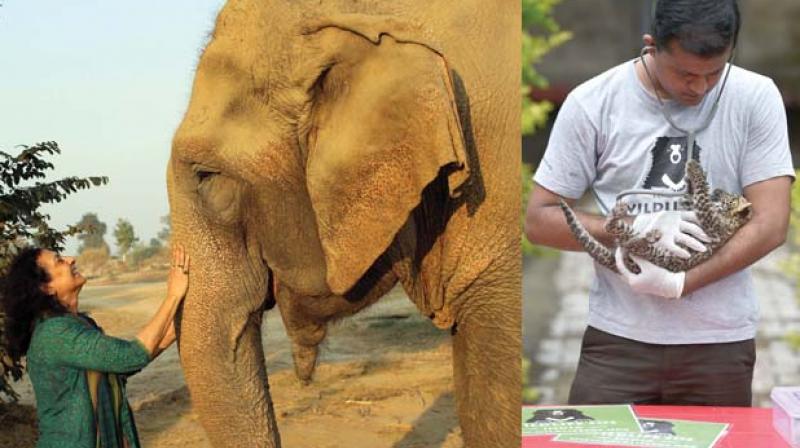WSOS, the NGO that heard the distress call of wildlife
The organisation got its flagship project which successfully eradicated the cruel practice of dancing bears' .

What began as one man’s passion to conserve biodiversity and to put an end to poaching of wildlife and habitat destruction has over time evolved into one of the largest wildlife organisations in South Asia – Wildlife SOS. Established in 1995 with the belief that providing sustainable alternative livelihoods and education to communities dependent on wildlife and natural resources would lead to sustainable wildlife protection, this non-profit organisation has actively worked on various projects targeted at biodiversity and habitat conservation, awareness, anti-poaching operations and rehabilitation of communities dependent on wildlife for their livelihood.
Co-founder and CEO Kartick Satyanarayan told Deccan Chronicle that he observed numerous incidents of wildlife poaching and habitat destruction while doing a research for the Wildlife Conservation Society. “The situation was alarming and such illegal activities were doing an irreversible and wide spread damage to our eco-systems. I decided to do something about it. The trigger was a series of incidents that included one where I tracked and apprehended a forest criminal (timber smuggler) from inside a forest while working as a wildlife biologist gathering data on wild animals using line transect systems. The incident sparked what eventually became a raging fire inside me. I was consumed by an urge to do more than just help. I could not stand by and watch any longer and had to be a catalyst, a change-maker and use every living moment to help this cause.”
He said it was a real emergency situation, “rather an SOS for India’s forests and wildlife” and the NGO was born and christened Wildlife SOS. The organisation got its flagship project which successfully eradicated the cruel practice of ‘dancing bears’ (a form of torture and abuse of bears as they jump up and down in pain when their handlers pull their rope which was practiced as an entertainment) when his distant cousin and a lecturer at Delhi University Geeta Seshamani approached him to conduct a study on the cruel practice. Ms Seshamani, who co-founded WSOS, had already got exposure and expertise in different angles of the wildlife sector as she was running Friendicoes Society for the Eradication of Cruelty to Animals since April 1979.
As part of the project, WSOS rescued over 628 endangered sloth bears from illegal custody, while helping nomadic communities with sustainable alternative legal livelihoods to help establish a successful model. It was done in partnership with indigenous communities so that they did not need to exploit the bears any more.
The team now also works extensively to protect elephants and has set up the country’s first Elephant Conservation and Care Centre, which is an elephant camp and also the country’s first elephant hospital, near Mathura, Uttar Pradesh. “The goal of our elephant project is to help prevent illegal trafficking of elephants, while improving the lives of elephants living in captivity. We also developed a resource website recently (www.refusetoride.org) to sensitise tourists on the plight of elephants that give joyrides. If tourists stop riding elephants, it will stop trafficking of elephants and the cruel abuse they suffer to make them rideable will also grind to a halt,” said Mr Satyanarayan.
Apart from running two Elephant Care facilities, WSOS also works with leopards, monkeys, birds, Asiatic black bears (Moon Bears) and Himalayan brown bears. They also focus on two species that have been at the root of intense animal-human conflicts in the country, particularly in Jammu & Kashmir (black bears, brown bears and leopards) and in Maharashtra (leopards). The team runs two rescue centres for black bears in Kashmir and one for leopards in Maharashtra. “Our mission is to encourage communities to tolerate, accept and live in coexistence with these magnificent species,” WSOS volunteers said.
A 24-hour hotline is run in Delhi, Uttar Pradesh and Gujarat where dedicated teams work round the clock attending to distress calls from the public, police, animal lovers and other organisations on wild animals in peril or caught in conflict situations.
The NGO, which has completed 23 years of service, organises vocational courses and seed funding for women to start businesses in Rajasthan, Madhya Pradesh, Uttar Pradesh and Haryana. This allows women to become secondary breadwinners of their families and to be financially independent. The NGO provides educational opportunities to the children of Kalandars – the men who took dancing bears around, to help them break out of the cycle of poverty and oppression and to eliminate dependency on ‘dancing’ bears for an income, thereby reducing poaching and mistreatment of the animals. “Till date, we have helped provide education to over 5,000 Kalandar children and over 3,500 families are no longer dependent on wildlife crimes to sustain themselves. Instead, they now have humane and alternative livelihoods to support their families,” he said.
Over the years, the team has won various awards, including the First Planman Media Award for Environmental Activism (2009), The Elisabeth Lewyt Award for Disaster Management and Planning, Karamveer Puraskar constituted by the ICongo Civil Society, Limca People of the Year Award (2014), Indira Gandhi Paryavaran Puraskar and San Diego Zoo Global Conservation Medal for “Conservation in Action” (2018) to name a few.
“Our aim is to continue working towards changing the future for wildlife in the country by creating public awareness and working models which can be replicated across the country and other regions. We hope to establish more rapid response units across the country to help address the needs of wild animals in distress, while creating public awareness and educating children who will help protect our legacy for the future,” he said.

